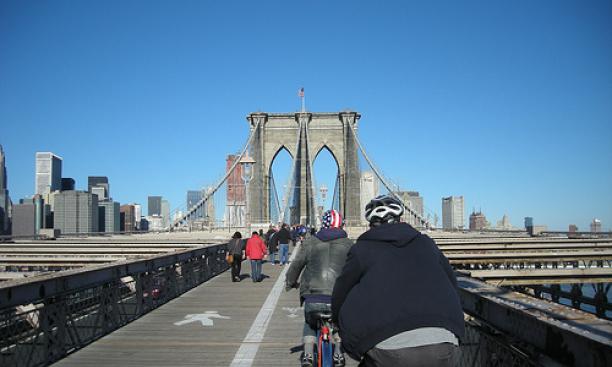
 |
Cyclists from UBikes cross the Brooklyn Bridge on their Oct. 25 ride. (Courtesy UBikes) |
A dozen Princeton students, staff members, and friends of the University's bicycle co-op made an ambitious ride through New York and New Jersey Oct. 25. The group, led by UBikes program manager Sean Gleason ’09 and Ph.D. candidate Jeffrey Domanski, helped to bring a new fleet of bikes to campus for use in a faculty and staff bike-share program.
The group met before dawn, taking the 5:12 a.m. train to Penn Station, and did not arrive back on campus until after dark, starting at the Worksman Cycles factory in Queens, pedaling over the Brooklyn Bridge to a ferry terminal in Manhattan, and continuing on into rural New Jersey before getting a lift from a University van for the last leg of the trip.
Climbing the hills of New Jersey's eastern highlands on heavy-duty three-speed bikes proved more time-consuming than the group expected, Gleason explained.
"We knew we were trying something absolutely crazy, and crazy's what we got," he said. The ride was meant to demonstrate the benefits of sustainable, local choices, like the one UBikes made when it purchased 100 new bikes from Worksman.
It was not an entirely smooth journey. In New York, the riders meandered through traffic and arrived at the ferry terminal before their support van. ("I think that says something pretty awesome about bikes in the city," Gleason said.) In New Jersey, the group departed the ferry at the wrong stop and had to rework its route. But the UBikes crew enjoyed the trip, Gleason said, riding through vivid fall foliage and watching the sunset before boarding the van.
In addition to the bike-share program, slated to begin next month, UBikes rents 120 new and refurbished bikes to Princeton students (all 120 are in use this semester, and there is a waitlist for the spring).
UBikes was founded in 2007 to fix a recurring problem: Students who lived far from Princeton would buy cheap bikes to get around, but when faced with the prospect of shipping the bikes home or paying for storage, they would abandon the bikes on campus racks. Damaged and neglected bikes often were discarded.
Gleason, a California native, knows the problem well because he was one of those students. His freshman-year bike ended up on the scrapheap. With U-Bikes, he said, students can have a quality bike for $30 per year and not have to worry about summer storage.
UBikes also runs the Cyclab, a do-it-yourself bicycle maintenance shop at 130 University Place that provides tools and workspace to campus riders on Wednesday nights and Sunday afternoons.
